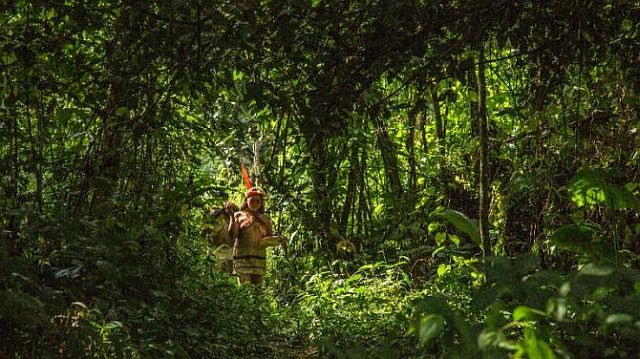
The Waorani barely seem to notice the stifling tropical heat in Gareno, a hamlet of wooden huts in the middle of the
Ecuadoran jungle. (AFP PHOTO)
Gareno, Ecuador – The indigenous peoples of the Amazon are far removed from the Paris conference rooms where politicians and technocrats in dark suits hashed out a historic deal on curbing climate change to close out the year.
But they are taking bold action of a different kind to save the rich biodiversity of the planet’s largest rainforest, whose survival is essential to limit global warming.
In Ecuador, one tribe has swapped hunting for growing cocoa. Another in Brazil has started managing its fish stocks. And one in Peru set up an indigenous local government to protect its environment from oil, mining and logging companies.
The Waorani barely seem to notice the stifling tropical heat in Gareno, a hamlet of wooden huts in the middle of the Ecuadoran jungle.
Every morning, they chant a ritual work song in their native language, Waotededo, before heading out to their fields for the day.
Keen to preserve their environment, in 2010 they gave up hunting, their traditional livelihood, and replaced it with farming cocoa.
The Waorani had noticed the game they hunted was increasingly hard to find.
To combat the problem, an indigenous women’s group, the Association of Waorani Women of the Ecuadoran Amazon (AMWAE), created a program that gives cocoa trees to local women if their husbands stop hunting.
“They gave up hunting wild animals, and we took up farming without cutting down the forest,” said AMWAE president Patricia Nenquihui.
Ten indigenous communities are participating in the project — 70 families who farm 25 hectares in the eastern provinces of Pastaza and Napo.
The association buys their crop from them for $1.25 a pound — 45 cents above the market price — and sends it to the capital, Quito, to be made into chocolate.
At first, the men were “upset” over the program, said Nenquihui. But the older generations admitted that hunters had to walk up to one full day through the jungle to hunt the animals they sold to provide for their families.
“We opened our eyes,” said Ligia Enomenga, a 26-year-old widow who is raising her six children thanks to the money she earns growing cocoa.
“Before, (the men) hunted a lot. Now they have joined the cocoa project and stopped killing animals,” she said.
“We hunted a lot… Wild pigs, monkeys, toucans. Sometimes we brought out five or six quintals (500 to 600 pounds, 230 to 275 kilograms),” said Moises Enomenga, whose wife now farms cocoa instead.
Disclaimer: The comments uploaded on this site do not necessarily represent or reflect the views of management and owner of Cebudailynews. We reserve the right to exclude comments that we deem to be inconsistent with our editorial standards.
